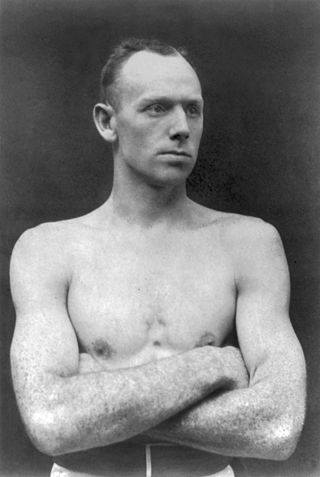
Robert James Fitzsimmons was a British professional boxer who was the sport's first three-division world champion. He also achieved fame for beating Gentleman Jim Corbett, and he is in The Guinness Book of World Records as the lightest heavyweight champion, weighing just 167 pounds when he won the title. Nicknamed Ruby Robert and The Freckled Wonder, he took pride in his lack of scars and appeared in the ring wearing heavy woollen underwear to conceal the disparity between his trunk and leg-development.
1854 in sports describes the year's events in world sport.
1856 in sports describes the year's events in world sport.

Bare-knuckle boxing is a full-contact combat sport based on punching without any form of padding on the hands. The sport as it is known today originated in 17th-century England and differs from street fighting as it follows an accepted set of rules.

1851 in sports describes the year's events in world sport.
1855 in sports describes the year's events in world sport.
Boxing in the 1920s was an exceptionally popular international sport. Many fights during this era, some 20 years away or so from the television era, were social events with many thousands in attendance, both men and women.

1853 in sports describes the year's events in world sport.

Jack Sharkey was a Lithuanian-American boxer who held the NYSAC, NBA, and The Ring heavyweight titles from 1932 to 1933.

James "Jem" Mace was an English boxing champion, primarily during the bare-knuckle era. He was born at Beeston, Norfolk. Although nicknamed "The Gypsy", he denied Romani ethnicity in his autobiography. Fighting in England, at the height of his career between 1860 and 1866, he won the English Welterweight, Heavyweight, and Middleweight Championships and was considered one of the most scientific boxers of the era. Most impressively, he held the World Heavyweight Championship from 1870 to 1871 while fighting in the United States.

William Perry, known as "The Tipton Slasher" after his native town of Tipton, was a British heavyweight prize fighter of the 19th century and claimed the championship of England, with some dispute, for two periods between 1850 and 1857. His fighting career began in London in 1835 and after fighting a number of highly rated championship contenders, he first claimed the English heavyweight championship by defeating Tom Paddock in twenty-seven rounds on 17 December 1850.

William Abednego Thompson, also known Bendigo Thompson, was an English bare-knuckle boxer who won the heavyweight championship of England from James Burke on 12 February 1839. He was inducted into The Ring magazine Hall of Fame in 1955, the International Boxing Hall of Fame in 1991, and the Bare Knuckle Boxing Hall of Fame in 2011. His nickname of "Bendigo" lives on in the name of a city and creek in Australia.
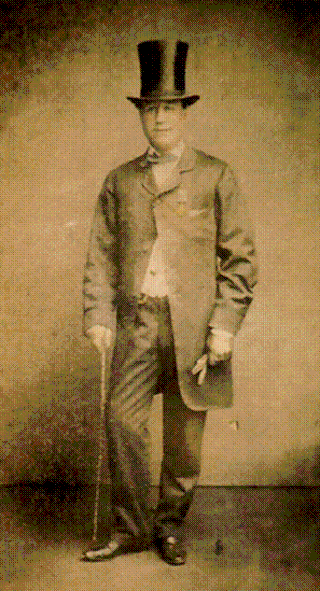
Tom Sayers was an English bare-knuckle prize fighter. There were no formal weight divisions at the time, and although Sayers was only five feet eight inches tall and never weighed much more than 150 pounds, he frequently fought much bigger men. In a career which lasted from 1849 until 1860, he lost only one of sixteen bouts. He was recognized as heavyweight champion of England between 1857, when he defeated William Perry and his retirement in 1860.

Tom King also known as "The Fighting Sailor" was an English boxer who fought both bare-knuckle and with gloves. Strong, fast, and durable he was a skilled pugilist. One of his quirkier pre-fight rituals was to drink a tot of gin before every bout. He retired from the ring in 1863, as the Heavyweight Champion of England, following his defeat of the reigning champion Jem Mace and American contender John C. Heenan.
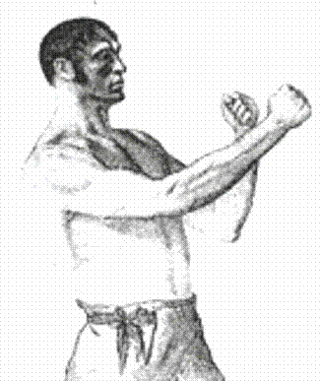
Tom Spring was an English bare-knuckle fighter. He was champion of England from 1822 until his retirement in 1824. After his retirement he became landlord of the Castle Inn at Holborn in London, where he arranged the patronage and contracts of many of the major boxing events of the period while overseeing fair play in the ring.
1850 in sports describes the year's events in world sport.
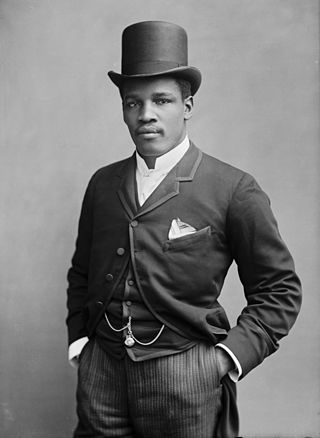
Peter Jackson was an Australian heavyweight boxer who had a significant international career. Jackson was inducted into the International Boxing Hall of Fame in the inaugural 1990 class, as well as being the 2004 inductee for the Australian National Boxing Hall of Fame in the Pioneers category.
Johnny Broome was a lightweight bare-knuckle boxer.
Sam Hurst, nicknamed the Stalybridge Infant in ironic reference to his considerable physical size, was the English bare-knuckle boxing champion 1860–61. He was born in Marsden, in Yorkshire, England, but in 1857 moved to Stalybridge, where he took a job in the local iron foundry and worked as a bouncer at the White House public house. Hurst was also a notable Lancashire wrestler.
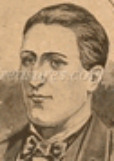
Henry Alfred Broome was a boxer from the bare-knuckle fighting era who became heavyweight champion of England in September, 1851 when he defeated fellow Englishman William Perry in Mildenhall, England. He lost the title in May, 1856 to Tom Paddock in Suffolk.













